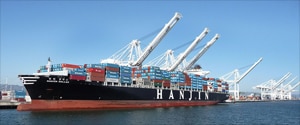Some believe Hanjin's bankruptcy signals that quantitative easing has no more power, and a global recession is on the horizon.

Asia was roiled in September by the spectacle of large container ships being detained in ports all around the region, and in some cases being boarded by determined bailiffs and policemen. Is the bankruptcy a harbinger of global recession, or just another symptom of Chinese mercantilism?
Hanjin, a major Korean shipping line and the world’s seventh-largest container shipper, had failed to keep up payments on its debt. Those of its vessels at sea or in port—thought to be 46 of a total 90 vessels—were forfeit.
The news left cargo headed to and from Asia—including US-bound consumer goods—in limbo. “Liner shipping is all about marketing and service reliability,” says Rahul Kapoor, director at maritime consultancy Drewry Financial Research Services. “We haven’t seen any large carriers come back from collapse.”
The drama intensified when it emerged that some vessels had been parked away from prying eyes and that their crews lacked food and basic necessities without the means to pay for them.
“Hardly a surprise,” says Lim Say Boon, chief investment officers at DBS Wealth Management in Singapore. “This is a crisis that has been waiting to happen. In shipping, as in many sectors, capacity has been steadily growing due to overly rosy forecasting and the availability of credit at historically low interest rates. Despite massive overcapacity, the biggest container ships that have ever sailed are still being built.”
According to Lim, “Many think the Hanjin crisis a sign that quantitative easing in all its forms has run out of steam and absent this artificial stimulus to GDP growth—be it in China, Korea or the US—we will soon face another recession.”
For China, it’s a case of “the man who rides the back of the tiger cannot safely get off,” says Lim. The Chinese, he argues, will continue adding shipping tonnage to drive out others, confident they can fill their ships with their own output. In the same way, they will try and drive out steel capacity while increasing their own. For China’s leaders, maintaining growth is an existential issue.
“In the 19th century coal miners kept canaries close. Methane, odorless and fatal, would kill the canary, and workers could evacuate in time to avoid the worst,” says Lim. “Think of Hanjin as the canary in the mine.”



